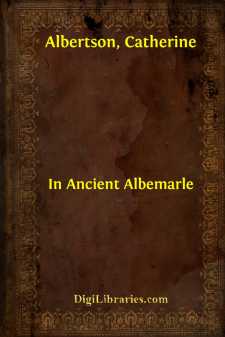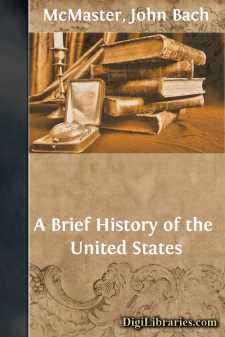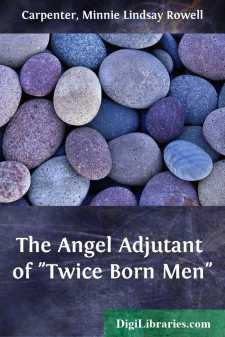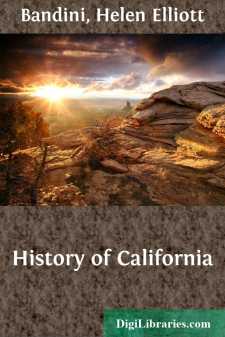History
- Africa 30
- Americas (North Central South West Indies) 50
- Ancient 68
- Asia 58
- Australia & New Zealand 8
- Canada 41
- Caribbean & West Indies 1
- Civilization 20
- Eastern Europe 12
- Europe 310
- Expeditions & Discoveries 60
- General 77
- Historical Geography 1
- Jewish 9
- Latin America 3
- Medieval 8
- Middle East 13
- Military 248
- Revolutionary 8
- Study & Teaching 5
- United States 353
- Western Europe 56
- World 13
History Books
Sort by:
THE PERQUIMANS RIVER From the Great Swamp's mysterious depths,Where wild beasts lurk and strange winds sough;From ancient forests dense and dark,Where gray moss wreathes the cypress bough;'Mid marshes green with flowers starred,Through fens where reeds and rushes sway,Past fertile fields of waving grain,Down to the sea I take my way. The wild swan floats upon my breast;The sea-gulls to my...
more...
CHAPTER I. HOW THE PRESS-GANG CAME IN. The practice of pressing men—that is to say, of taking by intimidation or force those who will not volunteer—would seem to have been world-wide in its adoption. Wherever man desired to have a thing done, and was powerful enough to insure the doing of it, there he attained his end by the simple expedient of compelling others to do for him what he, unaided,...
more...
COLUMBUS Behind him lay the gray Azores, Behind the Gates of Hercules; Before him not the ghost of shores, Before him only shoreless seas. The good mate said: "Now we must pray, For, lo! the very stars are gone. Brave Admiral, speak; what shall I say?" "Why say, 'Sail on! sail on! and on!'" "My men grow mutinous day by...
more...
INTRODUCTION. While our absent brothers are battling on the field, it is becoming that the friends at home should be eager for the minutest particulars of the camp-life, courage and endurance of the dear boys far away; for to the loyal lover of his country every soldier is a brother. The narrative related on the following pages is one of extraordinary "daring and suffering," and will excite an...
more...
by:
Allen Johnson
"ON TO CANADA!" The American people of today, weighed in the balances of the greatest armed conflict of all time and found not wanting, can afford to survey, in a spirit of candid scrutiny and without reviving an ancient grudge, that turbulent episode in the welding of their nation which is called the War of 1812. In spite of defeats and disappointments this war was, in the large, enduring...
more...
The Value of the One Lucy Lee laid her head on her pillow and, looking through the silence and darkness, smiled up to God. She had won her first soul for Him, and now made her offering. The capture was not a drunkard, nor an outcast–many of whom, in years to come, she was to wrestle over and deliver–but her own sister, whose golden hair lay over the pillow beside her, and whose regular breathing...
more...
Chapter I. The Land and the Name Once upon a time, about four hundred years ago, there was published in old Spain a novel which soon became unusually popular. The successful story of those days was one which caught the fancy of the men, was read by them, discussed at their gatherings, and often carried with them when they went to the wars or in search of adventures. This particular story would not...
more...
THE FIRST CHAPTER. Now Plautius had much adoo to find out the Britains in their lurking holes and couerts; howbeit when he had traced them out, first he vanquished Cataratacus, and after Togodumnus the sonnes of Cynobellinus: for their father was dead not verie long before. These therefore fléeing their waies, Plautus receiued part of the people called Bodumni Catuellani Bodumni (which were subiects...
more...
by:
Fa'iz El-Ghusein
FOREWORD I am a Bedouin, a son of one of the Heads of the tribe of El-Sulût, who dwell in El-Lejât, in the Haurân territory. Like other sons of tribal Chiefs, I entered the Tribal School at Constantinople, and subsequently the Royal College. On the completion of my education, I was attached to the staff of the Vali of Syria (or Damascus), on which I remained for a long while. I was then Kaimakâm of...
more...
I.—Celtic London When we see the words "Celtic London" at the head of a chapter we naturally feel inclined to ask, "Was there such a place? Was there any Celtic London?" Although it is almost impossible to answer such a question by either "yes" or "no," it may be worth while to examine it briefly before passing on to the domains of authentic history. In the first...
more...











